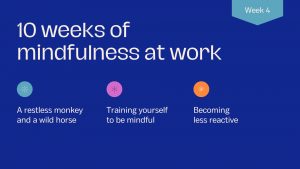10 Weeks of Mindfulness at Work
Welcome to week four of “10 Weeks of Mindfulness at Work” where you’ll discover simple tips and techniques to enrich your day with mindfulness. I hope you find inspiration from this series!
– A Restless Monkey and a Wild Horse
Nineteenth-century Indian mystic, Swami Vivekananda, wrote of the rampant activity of the mind, comparing it to that of a “restless monkey that becomes drunk and then is bitten by a scorpion.”
I love that image! I also love image of the untrained mind like a wild horse, as in this old story: A man, attempting to ride a wild horse, gallops past a farmer. The farmer shouts to the rider, “Where are you going?” The rider shouts back, “Don’t ask me, ask the horse!”
– Training Yourself to Be Mindful
The good news is that you can learn to train that horse (your mind), enabling you to direct it where you want it to go, rather than letting it run wild.
When you train yourself to be mindful, you’re learning to focus on the immediacy of the present moment, rather than being tossed about by your “STUFF” — an acronym I use for Stories, Thoughts, Urges, Frustrations and Feelings.
Like learning any new skill, it takes time and practice to become mindful. But your brain has neuroplasticity, or the ability to form new neural pathways and learn new ways of being in the world.
– Becoming Less Reactive
Developing mindfulness has so many benefits, both personally and professionally. For one, it helps you become less reactive, as if you’re putting a space between life and your response to life.
That extra space can be quite handy. For instance, let’s say you’re at work and your colleague sends you an email at the end of the day. You don’t like the tone of his email; you feel anger rising in you as you read his message. Your fingers take to the keyboard to fire back a response, giving your co-worker a piece of your mind.
But wait! Here’s where mindfulness comes in. You notice your reaction. You realize you don’t have to respond to his email immediately. You decide to wait until morning, when you can view the situation with a fresh outlook. This is the power of mindfulness. The power of adding space. The power of responding consciously, rather than reacting unconsciously.
Reflection:
-Have you ever added space between life and your response to life?
-How about your mind, does the restless monkey or wild horse comparison resonate with you?
WEEK FOUR PRACTICE SUGGESTION: Notice the activity of your mind. Is it restless? Can you add “space” before responding to events?

